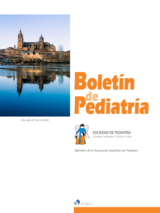Inmunoterapia oral con huevo en un hospital comarcal
D. Pérez Solís , B. Lastra Areces , A.R. Blanco Sánchez , A.I. Fernández Castro , M. Montes Granda
Bol. Pediatr. 2022; 62 (262): 279 - 284
Introducción y objetivos. La inmunoterapia oral (ITO) es una alternativa a la dieta de evitación en algunas alergias alimentarias. El objetivo de este trabajo es evaluar la eficacia y seguridad de la ITO con huevo en una consulta de alergia pediátrica. Material y métodos. Estudio observacional, longitudinal y retrospectivo de pacientes pediátricos con alergia al huevo persistente sometidos a ITO. Para la inducción se utilizó proteína de clara de huevo deshidratada administrada diariamente y con incrementos semanales hasta alcanzar una dosis de 4 gramos. Para la fase de mantenimiento se indicó una ingesta de al menos dos o tres huevos a la semana. Resultados. Se trataron 14 pacientes (6 niñas), de entre 5 y 13 años (mediana 5,5 años). Se consiguió desensibilización completa al final de la inducción en 11 pacientes (78,6%), que se mantuvo en todos ellos tras una mediana de tiempo de seguimiento de 29 meses. Durante la inducción los síntomas más frecuentes fueron: prurito orofaríngeo (9/14), dolor abdominal (7/14) y rinoconjuntivitis (6/14). Se emplearon antihistamínicos en 8 casos (57,1%) y ninguno precisó adrenalina. Entre los pacientes que consiguieron desensibilización se observó una tendencia al descenso de las IgE específicas, siendo estadísticamente significativo para las IgE a huevo completo (p = 0,047), clara de huevo (p = 0,031) y ovoalbúmina (p = 0,016). Conclusiones. La ITO con clara de huevo deshidratada resultó ser un tratamiento muy eficaz y bien tolerado en población pediátrica con alergia al huevo.
Oral immunotherapy with egg in a regional hospital
Background and objective. Oral immunotherapy (OIT) is an alternative to strict avoidance for the management of some food allergies. The aim of this study is to assess the efficacy and safety of egg OIT in a paediatric allergy outpatient service. Methods. Retrospective, longitudinal observational study in children with persistent hen egg allergy who received egg OIT. For the build-up phase, dehydrated egg white was used daily. Updosing was performed weekly at the allergy unit, up to a final dose of 4 grams. Maintenance phase was carried out with a daily intake of one egg at least two or three times a week. Results. 14 patients (6 girls), whose ages ranged from 5 to 13 years (median 5.5 years) were treated with egg OIT. Eleven subject (78.6%) reached total desensitization, and all of them remained desensitized after a median follow-up time of 29 months. The most frequent adverse effects detected during the build-up phase were: oropharyngeal pruritus (9/14), abdominal pain (7/14), and rhinoconjuntivitis (6/14). Eight patients (57.1%) required oral antihistamines, and none received adrenaline. In those subjects that reached total desensitization, a trend to lower specific IgE levels was observed. That trends were statistically significand for whole egg (p = 0.047), egg white (p = 0.031), and ovalbumin (p = 0.016). Conclusions. Egg OIT was an effective and well tolerated treatment in children with egg allergy.
Artículo completo (PDF) (445 kb.)
- Inmunoalergia
Buscar en el boletín
Año 2022, Volumen 62, Número 262

Boletín completo en PDF (1796 kb.)